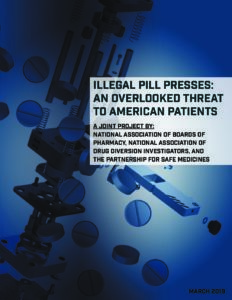Criminals in the US are still making fake pills with pill presses. What should state legislatures do about it?
As counterfeit pills made with dangerous substances proliferate in the U.S., lawmakers and regulators are grappling with whether stronger penalties for the misuse of pill presses or tighter control of the machines would deter homegrown pill makers. We’re not lawmakers or regulators, but we have looked at this issue, and here’s what we have found.
Is criminalizing pill presses an effective strategy?
Pill presses themselves are not illegal in the U.S.; they’re important tools for medicine and supplement makers. In 2018, however, Florida’s HB21 made using a pill press in the illegal production of controlled substances a third-degree felony punishable by five years in prison. When we asked for their opinions, prosecutors believed that time and budget limitations would lead their peers to focus on proving controlled substance trafficking charges, which carry much longer sentences than five years, and choosing not to indict for pill press law violations.
A case that concluded in April 2021 shows the reason for this: Ryan M. Sheldon, who trafficked cocaine and made fake Xanax in a garage in Tequesta, Florida, pleaded guilty to possession of a pill-making machine and four other third-degree felonies as well as a first-degree felony for cocaine trafficking. He received a sentence of five years total for all the third-degree felonies and almost eight years for selling cocaine, to be served at the same time. Because the cocaine charge carried a minimum of seven years, the prosecutor could have accomplished the same outcome without having to prove that Sheldon was using a pill press.
Would registering pill presses in a database be useful?
People who import pill presses from overseas are required to register them with the Drug Enforcement Administration, but there’s no universal registration for pill presses once they have entered the country. Texas has a statute that requires the Department of Public Safety to keep records of the sale of chemical precursors and lab apparatus, including pill presses, but there is no indication whether it is an effective approach to keeping track of apparatus that may be misused. The idea seems cumbersome: Laboratories like this one at Texas Woman’s University will comply, but—as with importing the machines— criminals won’t register their lab apparatus. Given that DEA and border agents struggle to catch pill presses coming into the country, safety and public health departments across the country clearly lack the resources to consistently find unregistered pill presses and enforce the law.

In 2019, PSM combined efforts with the National Association of Boards of Pharmacy (NABP) and the National Association of Drug Diversion Investigators (NADDI) analyze the problem pill presses posed to medicine safety and offer potential solutions. PSM and the NADDI updated the report in 2021.
Read the 2019 report and its 2021 update.
Is there a better path?
Although it has not been made law, federal legislators have considered the Criminalizing Abused Substance Templates (CAST) Act, which would raise the penalty for possession of a press mold with intent to counterfeit schedule I or II substances to 20 years in prison. 20 years for counterfeiting scheduled pills is a much more substantial penalty than Florida’s five years.
If we were a state legislator seeking a deterrent for criminals considering careers in pill manufacturing, we would suggest passing a law that significantly escalates penalties for anyone convicted of distributing controlled substances if they also were caught with a pill press and pill mold. This would give prosecutors additional ammunition to use in the penalty phase, or the flexibility to negotiate if they want to resolve the case without a trial.
Regardless of whether these kinds of statutes change there is still work to be done. Educating officers and agents about what pill presses are and what they look like—assembled and disassembled—has a huge impact on the counterfeit pill trade. Law enforcement who recognize pill presses have tracked them to bad actors, shut down drug trafficking rings, and imprisoned criminals again and again.